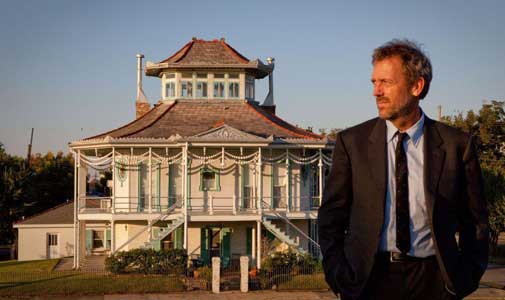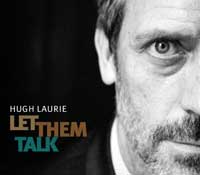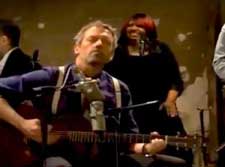
LOS ANGELES -- Hugh Laurie, the British star of Fox's House, occasionally has displayed his piano-playing prowess on that drama series -- but for a PBS Great Performances special Sept. 30, keyed to his new album of New Orleans blues, he brings his piano, his guitar and his voice center stage. And in explaining Saturday how he came to discover and love the music of Muddy Waters and others, Laurie made a larger point that isolated and attacked -- precisely and perfectly -- one of the biggest problems with our current multimedia culture...

"I heard it, to begin with, on the radio," Laurie said of New Orleans music, commenting at a Television Critics Association press conference for Hugh Laurie: Let Them Talk -- A Celebration of New Orleans Blues. "God bless the radio.
"And I've gone back to the radio," he added, "and I've gone back to vinyl, because I think there is something slightly corrosive about the whole iPod experience of surrounding yourself with only your favorites. I don't think any of us should be surrounded by our favorite anything.
"We should, all of us, be brought up against different things, new things, things you've never heard, and the radio is a wonderful way to do that."
Think of that. From people who listen only to their own playlists, to viewers who watch only Fox News or MSNBC to hear their standing opinions reconfirmed, one of the hugest problems with today's 24-hour, everything-available technology is that the more that's out there to absorb, the less people seem to seek out. That's true of classic series on DVD, and reissued CD box sets of vintage music, and old movies, and lots more. The way to expand your mind, and your taste, is to experience the unknown, not just the soothingly familiar.
"As soon as I heard my first Willie Dixon song," Laurie continued, "I was on the hunt, and I would spend my pocket money on whatever blues records I could find. Muddy Waters was my first when I was on that guitar part. Muddy Waters was where I spent most of my teenage years, just listening to him over and over again.
And the more I listened to him, the more I started to hear, even on a crappy little mono record player, the piano playing of Otis Spann -- because Muddy Waters, of course, had an unbelievable, never-to-be-repeated band. Otis Spann's piano playing was something that I became absolutely entranced by, and knew that I wanted to at least hear it forever, if not actually try and play it forever."
That's a strong plug for keeping your ears and mind open.

I'd like to give just as strong a plug for Laurie's Let Them Talk CD, which you can pre-order by clicking HERE. It's released in the States on Sept. 6 -- but I got mine a while ago as a British import, and was surprised, if not shocked, at how good it is, and how thoroughly smart and listenable.
The opening track, "Saint James Infirmary," is a fun track to play for friends and challenge them to identify the recording artist. The first two minutes or so feature an extended instrumental opening, with Laurie playing a tasteful, muted, almost mournful piano, then rising with the band as the song builds. When he finally starts singing, Laurie's voice is higher than you'd expect, and a bit more supple, and a lot less... British.
 Other standout tracks include "You Don't Know My Mind" (which opens the TV special), "John Henry" and "Winin' Boy Blues." There are guest artists, too: singers Irma Thomas and Tom Jones, the inimitable Dr. John, and fellow New Orleans musical legend Allen Toussaint, who provides the horn arrangements for the backup band.
Other standout tracks include "You Don't Know My Mind" (which opens the TV special), "John Henry" and "Winin' Boy Blues." There are guest artists, too: singers Irma Thomas and Tom Jones, the inimitable Dr. John, and fellow New Orleans musical legend Allen Toussaint, who provides the horn arrangements for the backup band.
The album, like the TV special, is an obvious labor of love -- and, for Laurie, a dream come true that he almost walked away from before it started.
"When a man from the record company -- a British arm of Warner Bros., Warner UK -- said to me, 'Do you want to make a record?,' I could feel the word 'No' rising up in me, because I was about to say, 'You're out of your mind. Why would I? would be killed for trying to do that.' You know, that way madness lies.
"And then, when the word 'No' got to about here," Laurie continued, putting his hand to chest level, "I sort of just put the brakes on. I thought, 'No, wait a minute, this is not going to come my way again, certainly not in this form.' "
Laurie realized he had suddenly reached a point, he explained, "where I will either be able to say to my grandchildren, 'You know, I could have made a record,' or I will say, 'I made a record, and here it is.' And they will go, 'That's the worst thing I've ever heard in my life.'
"But no matter," he added, smiling. "No matter... This was a diem I had to carpe."